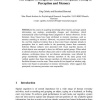Free Online Productivity Tools
i2Speak
i2Symbol
i2OCR
iTex2Img
iWeb2Print
iWeb2Shot
i2Type
iPdf2Split
iPdf2Merge
i2Bopomofo
i2Arabic
i2Style
i2Image
i2PDF
iLatex2Rtf
Sci2ools
SPATIALCOGNITION
1998
Springer
1998
Springer
The Impact of Exogenous Factors on Spatial Coding in Perception and Memory
In the course of acquiring knowledge about layouts and maps spatial information can undergo considerable changes and distortions, which systematically affect knowledge-based judgments of human observers. In the literature, these biases have been attributed to memory processes, such as memory encoding or retrieval. However, we present both theoretical reasons for, and first empirical evidence that at least some biases originate already in perception, that is, much earlier in the processing stream than commonly believed. Human subjects were presented with visual map-like layouts, in which objects were arranged to form two different spatial groups. When asked to estimate distances between object pairs and to verify statements about spatial relations, verification times, but not distance estimations, were affected by group membership: Relations between members of the same group were verified quicker than those between members of different groups, even if the Euclidian distance was the same...
Information Management | Maps Spatial Information | Memory Processes | Spatial | SPATIALCOGNITION 1998 |
| Added | 06 Aug 2010 |
| Updated | 06 Aug 2010 |
| Type | Conference |
| Year | 1998 |
| Where | SPATIALCOGNITION |
| Authors | Jörg Gehrke, Bernhard Hommel |
Comments (0)

